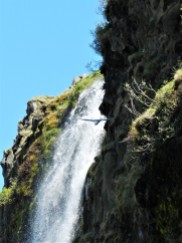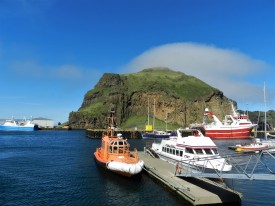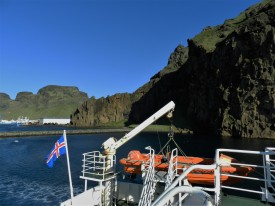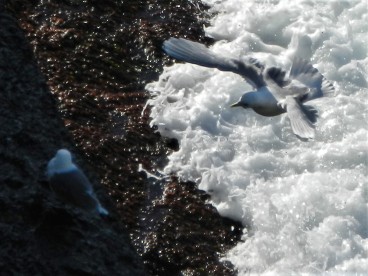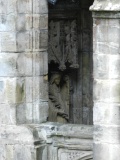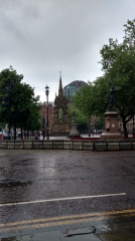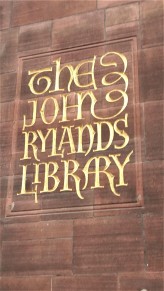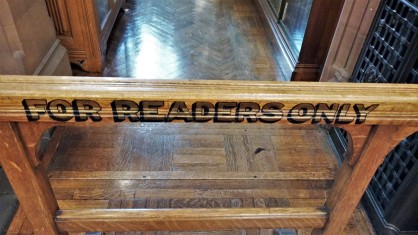It is said that 1 in 10 people in Iceland will publish a book. The everlasting daylight of summer gives way to cold and darkness in the winter where people must get creative to occupy themselves. (There is also a high percentage of musicians in Iceland). Reykjavík has a lot of bookstores and there are many Icelandic authors – about half the books are in English and half in Icelandic in the stores.
I have long wanted to go to Iceland – something about the natural beauty, and maybe the creativity goes along with that in some way. In planning the trip, I had been more aware of my Welsh ancestry, but I do have a small percentage of Scandinavian DNA, 3% by Ancestry.com estimates. Maybe this was through various ancient European migrations, more recent linkages through my father’s Polish side (where we cannot get back much more than my Great Great grandparents who immigrated to the USA), or perhaps most likely through Viking raids into Britain (my mom has a surprisingly high percentage of Scandinavian DNA).
I walked through several bookstores, looking to pick up a book by an Icelandic author. Laxness novels were well represented, but what caught my eye was a trilogy by Jón Kalman Stefánsson and these books accompanied me throughout our journeys in Iceland, on the 8 hour plane flight back to Seattle, and for my first week back in the States as I finished reading them. I liked them so much that I will provide a short review of the books (possibly giving away a little bit of plot), or maybe just list a few of my favourite quotes. Not only were they great books that I found very gripping, but also, perhaps one gets a bit more of a feel for a culture reading its literature and going into the inner psychological and narrative realms, in addition to moving through the beautiful and awesome landscapes.
The weather was very nice when we were in Iceland, but internally I was whipped by the cold sea water and snow and ice of Iceland winter as I read Kalman’s books. Death, life, poetry, the life and death demands of writing and reading, the struggle to find home, to find identity, and the struggle of creatives to find a place in society that often did not provide a place for creativity are some of the themes of these books: Heaven and Hell; The Sorrow of Angels; and The Heart of Man.
Heaven and Hell

“Our words are a kind of rescue team on a relentless mission to save past events and extinguished lives from the black hole of oblivion, and that is no easy task; along the way they are welcome to find some answers, then get us out of here before it is too late. Let this suffice for now, we’ll send the words on to you, those bewildered, scattered rescue teams unsure of their task, all compasses broken, maps torn or out of date, yet you should welcome them. Then we shall see what happens,” (3).
Thus begins the book which follows “the boy” (no name is given which makes him a kind of everyman/everyperson). He has lost everyone he cared about in his life. Father drowned at sea, he and his brother fostered out to homes in other villages. He receives letters from his mother, until she and his young sister die of illness. His mother wrote him about her and his father’s passion for books and reading.
“We thought continuously about books, about being educated, became fervent, frantic, if we heard of some new interesting book, imagined what it might be like, spoke about its possible contents in the evenings, after you’d gone to bed. And later we’d read it in turns, or together, when and if we managed to get hold of it, or a handwritten copy of it,” (34).
The boy is befriended by Bárður, another lover of books, and they work on fishing boats, out in the sea, fishing for cod. One early morning they are preparing for sea. Bárður goes back to the house to read through some lines of Paradise Lost, to read to the boy and savour when they are out at sea with the crew in the small sixareen. Bárður remembers the poetry, but he forgets to bring his waterproof coat and a sudden winter storm lashes down upon the crew while they are pulling up their lines.
Bárður had taken the boy to the village to visit an old blind sea captain, blind like Milton was when he dictated Paradise Lost. Kolbeinn, the blind captain says to Bárður, “you see…it will change your life, which could certainly use a change,” (55). The book does certainly prove to change Bárður’s life. As they row out to sea, Bárður is thinking about the lines from Paradise Lost. Kalman doesn’t bother setting off quotes when someone is talking or reciting lines of poetry, it all runs together without clear separation of inner and outer.
“Bárður pants and mumbles something, in snatches of the strain…cowl casts…colour of dusk. All of their hearts beat fast. The heart is a muscle that pumps blood, the abode of pain, loneliness, joy, the one muscle that can keep us awake at night,” (50).
When the rain and snow starts, Bárður realizes he does not have his waterproof.
“Damned waterproof, I forgot it, and Bárður curses more, he curses having focused unnecessarily on memorizing lines from Paradise Lost, so focused that he forgot his waterproof…This is what poems can do to us,” (60).
It begins to become clear, quite quickly, that Bárður’s life is in danger. Their captain, a man of few words, begins to chant. He goes through a kind of shamanic transformation – such is the power of words when they are forged deep within the center of being. Words have an energy and his chants begin to build up heat as he recites the only poems he knows, at first about heroism on the sea, but eventually obscene verses. As the heat builds, perhaps the heat of these words can save him from the foolishness fix that carrying poetry rather than a waterproof have gotten him into…
“The verses gush out of him. As if to exorcise the arctic cold itself. The verses become steadily more raw, more violent, and Pétur is transformed. He is no longer a silent, serious skipper, the workhorse, something ancient and dark awakens in him, this is no longer poetry that wells up from within him, poetry is for laggards and schoolmen, this is a primitive force, a language with deep roots in a dim subconscious, sprung from a harsh life and ever present death. Pétur grows burning hot and he rocks rhythmically on the thwart, slaps his hands now and then on his thigh when the rhyming words become so heavy that it is difficult for the human body to handle them, because the human body is delicate, it cannot bear the impact of large rocks, cannot bear avalanches, the stinging cold, cannot endure loneliness, cannot endure rhyming words heavy with antiquity, saturated with lust, and this is why Pétur slaps his thigh, to bring words forth, and the five men start in surprise, everyone bound by this primitive power streaming from their skipper…Pétur has taken off his sou’wester, he has been sweating,” (63-64).
Maybe this ancient force of words that has awakened from deep within the skipper can save Bárður, but alas, a doubt arises in Pétur’s mind, in his heart, and the words sputter to a halt and Bárður murmurs
“nothing is sweet to me, without thee, mumbles Bárður, the line of poetry written in the letter Bárður finished last evening, addressed to Sigriður… (71)…Bárður always went out at 8.00 to gaze at the moon and at the same time Sigriður watched as well, there were mountains and distances between them but their eyes met on the moon, precisely as the eyes of lovers have done since the beginning of time, and that is why the moon was placed in the sky,” (103-104).
Bárður freezes to death and dies in the boat before they get to shore and the boy has lost his anchor to this world again.
“Some poems take us places where no words reach, no thought, they take you up to the core itself, life stops for one moment and becomes beautiful, it becomes clear with regret and happiness. Some poems change the day, the night, your life. Some poems make you forget your waterproof, the frost comes to you, says, got you, and you’re dead,” (85).
The boy is driftless, without purpose, without connection to the social world. He decides he will kill himself, but first he needs to return the copy of Paradise Lost that Bárður borrowed from the blind sea captain, Kolbeinn. This book that caused the death of his friend becomes the thing that keeps him alive, at least until he can return it. He struggles over mountain and snow. Returns the book, but rather than kill himself he is taken in by a group of intellectuals, misfits, and very interesting people who live on the fringe of society. Like a band of punk rockers, they find companionship through the thing they have in common: not fitting into society.
One person he met had studied and journeyed abroad and was a reader of books:
“He’d been in the habit for many years of making long journeys, most often abroad, since there is nothing to see in Iceland except mountains, waterfalls, tussocks and this light that can pass through you and turn you into a poet,” (118).
I thought this line was quite interesting – the very reason that someone might have wanted to leave Iceland to see the world is now the very reason that so many tourists journey to Iceland: to see “mountains, waterfalls, tussocks.” I’m not sure if many of the tourists who venture through Iceland on guided tours notice “the light that can pass through you and turn you into a poet.” But maybe that explains why so many Icelanders become writers – this light that is turning them all into poets, poets, who, like all poets, have no choice but to let lose their words upon the world.
“But why tell you these stories?
What terrifying powers, other than despair, fling us over the Unnameable in order to tell you stories of extinguished lives?
Our words are confused rescue teams with obsolete maps and birdsong in place of compasses. Confused and profoundly lost, yet their job is to save the world, save extinguished lives, save you and then hopefully us as well,” (95).
I won’t tell you the rest of the book and neither will I tell you more of the plot in the next two books, but I will share a few more quotes from the next two books.
The Sorrow of Angels

“Our movements may be uncertain, hesitant, but our goal is clear ― to save the world. Save you and ourselves with these stories, these snippets from poems and dreams that sank long ago into oblivion. We’re in a leaky rowing boat with a rotten net and we’re going to catch stars,” (10).
The book starts with what sounds like the dead speaking from beyond the grave, or maybe it is all the Writers in the world speaking out to all the Readers. The book has more harrowing journeys over snow and blizzards and sea. This book continues the theme of those creatives who have to write, who have to question the meaning and value of what is given them in this world and in the social structures.
“He who stays up too late is poorly fit for the next day’s work, but he who doesn’t follow his dreams loses his heart,” (24).
I will just provide one other quote from this book and we will skip the plot:
“Of what other use is poetry unless it has the power to change fate?” (26).
The Heart of Man

“Where do dreams end, where does reality begin? Dreams come from within, they trickle in from the world that we all have inside us, possibly distorted, but what isn’t distorted, what isn’t dented?” (9).”
This book continues on these themes of inner and outer reality, of what is created and what exists, of the inner movements of the heart against the struggles against the background of the social and physical landscapes. The boy is growing up. As I read these books I’m reminded of Dostoevsky, Camus, Kafka, but there is a bit of playfulness here along with a struggle against ending up bitter, like Louis Ferdinand-Céline if he had remained a poet and social critic and had not become a nihilist and anti-Semite. Kalman has elements of Existentialism, but he has hope, hope that the poets words can be rescue teams, search parties, that they can somehow find and redeem the heart of humanity.
“A nation that translates little, focusing only on its own thoughts, is constricted, and if it boasts a large population it becomes dangerous to others, as well, because most things are alien to it except for its own thoughts and customs. Translations broaden people, and thereby the world. They help you understand distant nations. People hate less, or fear less, what they understand. Understanding can save people from themselves. Generals have a harder time getting you to kill if you possess understanding. Hatred and prejudice, I say to you, are fear and ignorance; you may write that down,” (163).
How appropriate is this quote is – written in 2011 in the Icelandic and translated to English 2015 – with the rise of nationalism in the United States and around the world! Would that help us in our current state of the rampant rise of nationalism, intolerance, and the radical “other-ing” happening across the globe? Where can we find the light to fight this darkness sweeping the globe?
“I don’t know where the darkness comes from, yet I think that it comes from the same place as the light, and I think it grows dark because we let it happen. I think that it’s difficult to attain the light, often very difficult, but I also think that no-one attains it for us…If we don’t set out on our own, life is nothing,” (333).
Like Carl Jung, Kalman sees the light and dark arising from the same place. As Jung wrote:
“One does not become enlightened by imagining figures of light, but by making the darkness conscious.”
The boy, who often is more aware of his inner mind and heart as he struggles with the sea and the snow, which claim many victims throughout the books. He struggles to find out who he is, he struggles to learn love and his own heart, he struggles to find his way in a world that seems created for people who are non-reflective. As persistently the environment struggles to erase and eradicate life, there is this compensatory realm of the inner world of the heart and the way it journeys out into the outer world through word and stories – trying to find some meaning and truth.
“This is a war against oblivion, in the hope that hidden within the stories are words that free us from our fetters. You as well,” (87).
This ends our review of Jón Kalman Stefánsson’s trilogy. I have material for one more post following our trip from Reykjavik to Vestmannaeyjar Island, the last leg of our trip that circles back around to Keflavik airport and back to Seattle.









